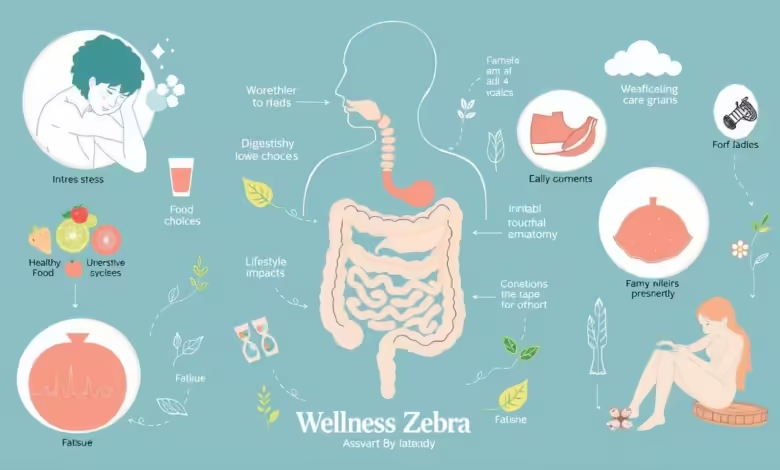Is Irritable Bowel Syndrome a Disability? Find Out

is irritable bowel syndrome a disability
Perverse bowel pattern( IBS) is a common gut complaint that affects multitudinous people around the world. It can greatly affect someone’s daily life, making you wonder: Is IBS a disability? This article will look into what makes someone disabled, how IBS affects people, and what help is out there for those dealing with it.
A serene, abstract representation of the challenges faced by individuals with irritable bowel syndrome, featuring a subtle blend of calming colors like soft blues and greens, intertwined with abstract forms symbolizing digestive organs, set against a backdrop of gentle waves and fluid shapes to evoke a sense of discomfort and relief. Incorporate the brand name “Wellness Zebra” subtly integrated into the organic forms, without overt text elements.
Understanding Irritable Bowel Syndrome (IBS)
IBS is a habitual condition that affects the large intestine. It brings symptoms like abdominal pain, bloating, diarrhea, and constipation. The exact causes are not known, but diet, stress, and gut changes play a role.
Symptoms and Causes of IBS
The main symptoms of IBS are:
- Abdominal pain or discomfort
- Bloating and gas
- Alternating episodes of diarrhea and constipation
- Mucus in the stool
IBS causes are not fully understood. But, it might be linked to:
- Imbalances in the gut microbiome
- Increased sensitivity of the gastrointestinal tract
- Stress and anxiety
- Certain dietary triggers, such as foods high in fermentable carbohydrates (FODMAPs)
How IBS Affects Daily Life
IBS can greatly impact daily life, making it hard to do everyday tasks. Its unpredictable symptoms make it tough to manage work, social, and personal life. IBS can also cause feelings of embarrassment, anxiety, and social isolation, making things worse.
“IBS can be a debilitating condition that disrupts daily life, but with proper management and support, individuals with IBS can find ways to better manage their symptoms and improve their overall well-being.”
Defining Disability in Legal Terms
To see if irritable bowel syndrome (IBS) is a disability, we need to know the legal definition of disability. The Americans with Disabilities Act (ADA) and other disability laws say a disability is a physical or mental issue that greatly limits major life activities.
The ADA says someone has a disability if they have a condition that makes doing everyday tasks hard. This includes taking care of oneself, working, or doing other important things in life. This rule helps decide if someone with IBS is disabled and can get disability laws’ benefits and help.
“The legal description of disability is a complex and evolving generality, with various factors taken into consideration to determine an existent’s eligibility for disability- related benefits and lodgment.”
Looking at the legal definition of disability and its link to IBS helps us see the rights and protections those with this condition might have.
” An abstract representation of legal delineations, featuring a balanced scale representing justice, intertwined with imagery of medical symbols like a stethoscope and healthcare symbols, all girdled by vibrant colors representing health and wellness, with an elegant touch of zebras subtly integrated into the design, emphasizing the brand name ‘Wellness Zebra’.”
Is Irritable Bowel Syndrome a Disability?
Figuring out if Irritable Bowel Syndrome (IBS) is a disability is tricky. It depends on many things. The severity of symptoms, how much it affects daily life, and if treatments work well all matter.
Factors that Determine Disability Status
For IBS to be seen as a disability, it must really limit someone’s daily activities. This includes work, taking care of oneself, and socializing. The condition must also be ongoing and hard to manage.
- Severity of IBS symptoms: Severe symptoms that make daily life hard may mean someone is disabled.
- Impact on daily functioning: If IBS stops someone from working, going to school, or doing important tasks, it could be seen as a disability.
- Availability of effective treatments: If treatments don’t work and IBS still affects life a lot, it might be seen as a disability.
Deciding if IBS is a disability is done for each person, looking at their specific situation and medical facts. Getting advice from doctors and lawyers can help people understand their rights and if IBS could be seen as a disability.
A serene and detailed illustration of various factors contributing to Irritable Bowel Syndrome as a disability, featuring a symbolic representation of stress, digestive system anatomy, healthy and unhealthy food choices, fatigue, and lifestyle impacts, all intertwined in a harmonious composition. Include subtle elements that evoke empathy and understanding, while incorporating the brand name “Wellness Zebra” in an organic way within the design.
” The key is to recognize that IBS can be a disabling condition, and work with medical professionals to document the strictness and impact of the condition on an existent’s life.”
Seeking Accommodation for IBS
If you have Irritable Bowel Syndrome (IBS), you might need special help at work. You are protected, according to the Americans with Disabilities Act (ADA). It sees IBS as a disability if it really limits your daily life.
Workplace Accommodations for IBS
Employers must give IBS accommodations so you can do your job well. These can include:
- Flexible scheduling for bathroom needs
- Private restrooms or special spaces
- Working from home or flexible schedules
- Breaks to manage stress and symptoms
- Changes to your work area, like headphones or ergonomic chairs
ADA protections for IBS help you do well at work without fear of being treated unfairly. Employers must work with you to find the best workplace accommodations for IBS. They look at what you need and what your job requires.
A serene office environment designed for comfort, featuring a cozy nook with plush seating, a small side table with herbal tea, plants for a calming atmosphere, and a discreet restroom sign nearby, reflecting the theme of IBS accommodations, illustrated in a soft color palette, incorporating the brand name “Wellness Zebra” subtly integrated into the decor.
“Employers have a duty to give reasonable lodgment to workers with disabilities, including those with IBS, to help them perform their essential job functions.”
Managing IBS Symptoms
It might be difficult to have Irritable Bowel Syndrome (IBS). However, things is possible to make things simpler. By changing your diet, managing stress, and using medical help, you can feel better. These steps can make life with IBS more comfortable.
Dietary Adjustments for IBS Symptom Relief
Changing what you eat is a key way to ease IBS symptoms. Avoiding foods that can make things worse, like those with fermentable carbs (FODMAP), helps a lot. Eating foods high in fiber, drinking plenty of water, and adding probiotics can also help.
Stress Management for IBS
Stress can make IBS worse, so it’s important to manage it. Yoga, meditation, and deep breathing can calm you down and ease your digestive issues. Regular exercise and talking to mental health experts can also help.
Medical Interventions for IBS
Sometimes, you might need medical help for IBS. Doctors can prescribe medicines like antispasmodics, antidepressants, or antibiotics. They might also suggest over-the-counter options like laxatives or anti-diarrhoeal meds. Regular doctor visits can help find the best treatment for you.
“The key to managing IBS is finding the right combination of dietary, lifestyle, and medical interventions that work best for your individual needs.”
Using a mix of diet changes, stress management, and medical care can help you take back control of your health. This way, you can live a better life with IBS.
Lifestyle Changes for IBS Relief
Making changes in your life can really help if you have irritable bowel syndrome (IBS). You can try changing your diet and learn ways to manage stress. These steps can help ease IBS symptoms.
Diet and Nutrition Tips
One big change is following a low-FODMAP diet. This diet cuts down on certain carbs that can upset your stomach. By watching what you eat and avoiding certain foods, you might feel much better.
- Pick fruits and veggies that are low in FODMAPs, like bananas, blueberries, and spinach.
- Try to eat fewer foods high in FODMAPs, such as wheat, dairy, beans, and some fruits and veggies.
- Drink lots of water to stay hydrated.
- Think about adding probiotics to your diet to help your gut health.
Stress Management Techniques
Stress can make IBS worse, so it’s important to find ways to relax. Try different effects to see what helps you the most, like:
- Use mindfulness or meditation to calm your mind and relax your body.
- Do regular exercise, like yoga or light cardio, to reduce stress and feel better overall.
- Make time for tone- care, similar as taking a warm bath or reading a book, to relax.
- Get support from friends, family, or a mental health expert to handle stress and anxiety.
By making these changes, people with IBS can often feel better and live a fuller life.
Medical Treatment Options for IBS
IBS is a condition that can really affect someone’s life. Making lifestyle changes can help, but there are also medical treatments available. These can help manage the symptoms of this gut issue.
Medications like antispasmodics and laxatives are often used. Antispasmodics relax the intestines, easing pain and discomfort. Laxatives help with bowel movements and can ease constipation. A doctor can prescribe these IBS medications to help with specific symptoms.
There are also IBS therapy options like cognitive-behavioral therapy (CBT) and hypnotherapy. These methods focus on the mind and emotions that might make IBS worse. By learning to handle stress and anxiety, people might see less severe symptoms.
“Comprehensive treatment for IBS often involves a combination of lifestyle modifications, medications, and therapies tailored to the individual’s needs.”
Working with a healthcare provider is key to finding the right medical treatment for IBS. By trying different IBS medication and IBS therapy options, people with IBS can find what works best for them. This can lead to better health overall.
Support Resources for IBS Patients
Living with Irritable Bowel Syndrome (IBS) can be tough, but you’re not alone. There are numerous support coffers out there to help. Connecting with IBS online communities and support groups is a great way to find relief and support.
Online Communities and Support Groups
Joining IBS support groups, online or in-person, brings many benefits. These groups offer a safe space to share stories, get advice, and feel supported by others who get it.
- Online forums let you connect with more IBS patients, sharing tips and strategies.
- Social media groups offer info, friendship, and encouragement, making you feel less isolated.
- Local groups provide face-to-face meetings and events for deeper connections.
Being active in these IBS support networks helps you understand your condition better. You’ll find new ways to manage it and feel more in charge of your health.
“For me, joining an IBS support group has changed everything. It’s reassuring to know that I’m not alone, and the shared experiences and advice have been invaluable in managing my symptoms.”
Whether you like online or in-person groups, the many IBS support resources out there can really help. They make a big difference in the lives of those dealing with IBS.
Raising Awareness about IBS
Educating people about Irritable Bowel Syndrome (IBS) is key to clearing up myths and helping those with the condition. IBS affects the digestive system and brings on symptoms that can really change daily life.
By spreading the word about IBS, we can reduce stigma and help those with it get the support they need. It’s vital to share true facts about what causes, signs, and ways to manage IBS. We must also remind everyone that it’s a real medical issue that can really lower someone’s quality of life.
With educational campaigns, advocacy, and open talks, we can make the community understand IBS better. This will aid those dealing with it and push healthcare to offer better diagnosis and treatment. By joining forces to spread awareness, we aim to make a place where people with IBS feel supported and understood.
FAQ
What is Irritable Bowel Syndrome (IBS)?
IBS is a chronic gut issue that causes stomach pain, bloating, diarrhea, and constipation. Its causes are not fully known but involve diet, stress, and gut bacteria changes.
How does IBS affect daily life?
IBS makes everyday tasks hard and can cause anxiety and social isolation. Its unpredictable symptoms and need for constant management disrupt work and personal life.
What is the legal definition of disability?
The legal definition of disability is a physical or mental issue that greatly limits major life activities. The Americans with Disabilities Act and other statutes serve as the foundation for this.
Is Irritable Bowel Syndrome considered a disability?
Whether IBS is seen as a disability depends on its impact and the treatments available. The law looks at how severe the symptoms are and their effect on daily life.
What type of accommodations can individuals with IBS receive in the workplace?
If IBS is a disability, people may get workplace accommodations. These could be flexible hours, private bathrooms, or working from home.
What are some effective strategies for managing IBS symptoms?
You can manage IBS symptoms by changing your diet, getting help with stress management, and seeing a doctor. The low-FODMAP diet and cognitive-behavioral therapy are effective methods.
What are some lifestyle changes that can provide relief for IBS?
Changing your lifestyle can help with IBS. This includes eating differently, like following the low-FODMAP diet, and managing stress well.
What medical treatment options are available for IBS?
In addition to dietary adjustments, IBS can be treated medically in a variety of ways. These include medicines, cognitive-behavioral therapy, and hypnotherapy, which help manage symptoms.
What support resources are available for individuals with IBS?
There are many resources for people with IBS. Joining online communities and support groups can offer advice, emotional support, and a sense of connection.
How can we raise awareness about Irritable Bowel Syndrome?
Raising awareness about IBS helps fight stigmas and ensures support for those with the condition. We can educate the public and clear up misconceptions about this condition.



